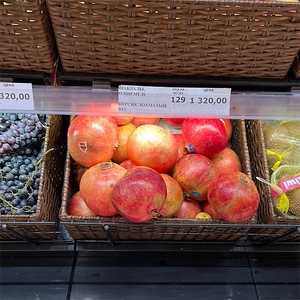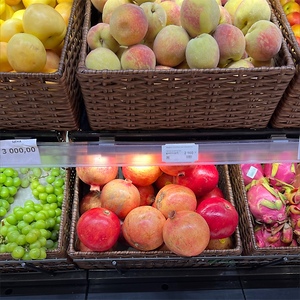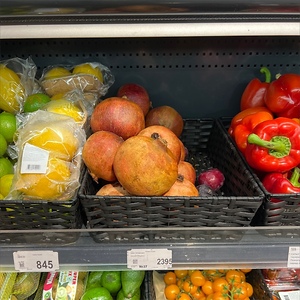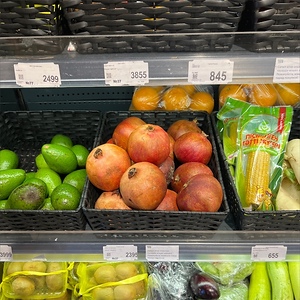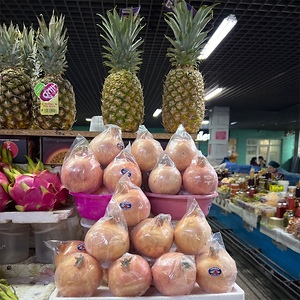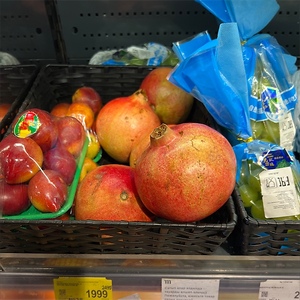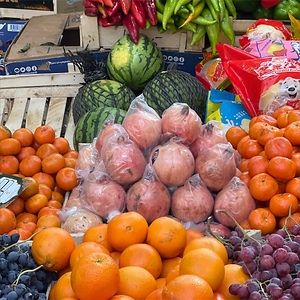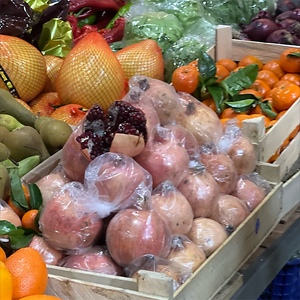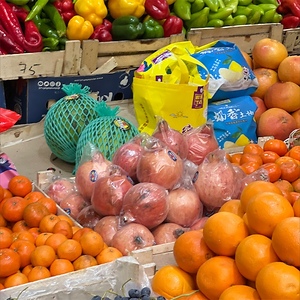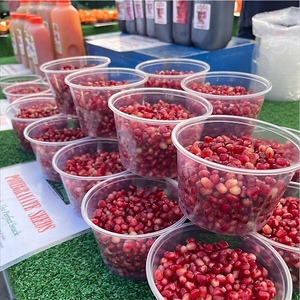


Pomegranates
Estimated Inventory, 25 lbs : 3.43
This item was last sold on : 07/14/25
Description/Taste
Pomegranates are small to medium-sized fruits, averaging 6 to 13 centimeters in diameter, and have a round, block-like appearance with faintly squared shoulders and a multi-pointed calyx at the top of the fruit. The skin, also known as the exocarp, is firm, leathery, tough, thick, and shiny, ranging in color from dark red, white, yellow, pink to dark purple, almost black. Underneath the surface, thick, spongy, and fibrous white membranes, or the mesocarp, encase many small, tightly compacted seeds into multiple chambers. Each seed is generally red or white, angular, and hard or soft, contributing a crunchy consistency, and is enveloped in a translucent, fleshy coating known as the aril. The translucent aril is lightly pigmented with a red, white, or pale pink hue, depending on the variety, and contains flavorful juice. Pomegranates should feel heavy for their size, and the surface can be easily scratched when ripe. The seeds and arils are the only portions of the fruit consumed, contributing a sweet-tart taste with tangy, fruity, and mildly acidic notes combined with rhubarb, cranberry, grape, and red currant nuances.
Seasons/Availability
Pomegranates are available in late fall through winter.
Current Facts
Pomegranates, botanically classified as Punica granatum, are ancient, sweet-tart fruits belonging to the Lythraceae family. The name Pomegranate is derived from the Latin words “pomum granatum,” meaning “apple with many seeds,” and is a descriptor used to showcase the fruit’s unique edible seeds. Pomegranates grow on small trees or shrubs ranging from 6 to 10 meters in height, and there are over 500 different cultivars grown worldwide. Red Pomegranates are the most recognized and commercially cultivated types, but Pomegranates can also be found in pink, white, yellow, and purple hues. Throughout history, Pomegranates have been used as a nutritious food and hydration source and are deeply intertwined into the cultural practices of many civilizations, seen as a symbol of life, fertility, sanctity, and vitality. In the modern-day, the seeds are consumed worldwide in both fresh and cooked preparations, favored for their sweet and tangy flavor and pigmented juice. Each Pomegranate can contain anywhere from 200 to 1,400 seeds.
Nutritional Value
Pomegranates are an excellent source of vitamin K to assist in faster wound healing, vitamin C to strengthen the immune system, fiber to regulate the digestive tract, and folate to develop red blood cells. The fruits also contain potassium to balance fluid levels within the body, manganese to maintain a healthy nervous system, and antioxidants, including punicalagin, that protect the cells against free radical damage and reduce inflammation.
Applications
Pomegranate seeds are entirely edible, well suited for both fresh and cooked preparations. The seeds can be extracted from the fibrous rind by slicing and breaking the fruit into 4 to 5 pieces. Once broken, the pieces can be submerged in water, separating the seeds from the bitter membranes, or the seeds can be collected by hand over a bowl. It is important to note that the pigmented juice will stain clothing, hands, and some countertop surfaces. Pomegranate seeds can be consumed straight, out of hand, or the seeds can be tossed into salads, sprinkled over grain bowls, stirred into yogurt, or used as an edible garnish over soups, roasted meats, and desserts. The seeds can also be blended into smoothies, pureed into salsa, dips, and relishes, or pressed into fresh juice. In addition to consuming the juice straight, Pomegranate juice can be used to flavor sauces for roasted meats, salad dressings, or desserts such as cheesecake, parfaits, tarts, crisps, mousses, and brownies. The juice can also be simmered into jelly or stirred into cocktails, sangria, sparkling beverages, and juice blends. Grenadine syrup is often flavored with Pomegranate juice, and the liquid is sometimes reduced to make Pomegranate vinegar or Pomegranate molasses. Pomegranate seeds pair well with nuts such as walnuts, hazelnuts, almonds, and cashews, meats including lamb, pork, and poultry, spices such as cardamom, ginger, cinnamon, and clove, parsley, fruits including apples, pears, grapefruits, oranges, coconuts, and lemons, dark chocolate, and feta cheese. Whole Pomegranates can be kept at room temperature for a couple of days, or they can be stored in a plastic bag in the refrigerator for 1 to 3 months. Once opened, the seeds should be stored in a sealed container for 3 to 5 days. The fruits can also be frozen for extended use.
Ethnic/Cultural Info
Pomegranates are one of the seven species mentioned by Moses in the Land of Israel. The story was recorded in the book of Deuteronomy and recounted Moses speaking to the Israelites stating that the seven species are meant to be a reminder of God’s faithfulness and the coming redemption. The seven species include Pomegranates, figs, barley, wheat, vines, honey, and olive trees. These species are important as they traditionally fruit or flower around Shavuot and Passover, a period believed by the Jewish community to represent opposing forces and seasons, creating a time for giving thanks. Pomegranates were also used as a visually artistic representation of faithfulness and abundance, stamped on ancient Jewish coins, chiseled onto temple walls, and woven into the patterns on high priest’s robes. In the modern-day, Pomegranates are used as table decorations during Jewish holidays as a symbolic reminder and to act as an attractive, colorful display.
Geography/History
Pomegranates are believed by experts to be native to a region extending across present-day Iran into Northern India and have been in existence since around 4000 BCE. The fruits were brought to the Mediterranean, Northern Africa, and China in ancient times through trade routes, where they were cultivated for commercial and culinary use. Pomegranates were also widely consumed and recorded in Ancient Greek and Roman texts. The fruits were later brought to Indonesia in the early 15th century and were introduced into the New World in the 17th and 18th centuries through Spanish explorers. In 1769, settlers carried Pomegranate seeds to California, and the seeds were planted at the Spanish missions along the coast. Today Pomegranates are grown worldwide in mild temperate to tropical climates, with concentrated production in the Middle East, the Caucasus regions, Central Asia, the Mediterranean, and Northern Africa. Pomegranates are also cultivated in the United States, the Bahamas, Central and South America, and Australia. When in season, the fruits can be found through local markets, distributors, and supermarkets.
Featured Restaurants
Restaurants currently purchasing this product as an ingredient for their menu.
| Lodge at Torrey Pines Grill | San Diego CA | 858-453-4420 |
| Waverly | Cardiff CA | 619-244-0416 |
| Bridges at Rancho Santa Fe | Rancho Santa Fe CA | 858-759-6063 |
| insideOUT | San Diego CA | 619-888-8623 |
| Herb & Wood | San Diego CA | 520-205-1288 |
| Solana Beach Kitchen | Solana Beach CA | 610-717-7217 |
| Hotel Indigo | San Diego CA | 619-295-3172 |
| Sheraton Carlsbad (20/20) | Carlsbad CA | 760-827-2400 |
| Coco Maya by Miss Bs | San Diego CA | 858-245-3780 |
| Claire's on Cedros - SKSB | Solana Beach CA | 858-259-8597 |
| Manchester Grand Hyatt San Diego | San Diego CA | 619-232-1234 |
| Craft House Fashion Valley | San Diego CA | 619-948-4458 |
| Mike Erlanson | San Diego CA | 619-453-7395 |
| Georges at the Cove | San Diego CA | 858-454-4244 |
| Webbcreationfood LLC | San Diego CA | 619-829-9194 |
| Craft House Sky Deck | San Diego CA | 619-948-4458 |
| The Guild Hotel | San Diego CA | 619-764-5108 |
| Sbicca Del Mar | Del Mar CA | 619-417-2587 |
| Wet Stone Winebar and Cafe | San Diego CA | 619-255-2856 |
| US Grant Hotel Main | San Diego CA | 619-232-3121 |
| Kettner Exchange | San Diego CA | 909-915-9877 |
| La Dona | San Diego CA | 858-352-8134 |
| Barleymash | San Diego CA | 619-255-7373 |
| Shorehouse Kitchen Carlsbad | Carlsbad CA | 858-663-9916 |
| Pacific Yacht Agents | Los Angeles CA | 808-214-0970 |
| Culinary Kitchen Catering and Events | Coronado CA | 619-798-8477 |
| Dot Cafe | San Diego CA | 914-263-1424 |
| Wolf In the Woods | San Diego CA | 619-851-7275 |
| Relic Bageri LLC | San Diego CA | 619-335-6328 |
| C 2 C | San Diego CA | 619-972-9345 |
| Institutes of Health LLC | San Diego CA | 800-270-5016 |
| Merenda | Oceanside CA | 703-459-4145 |
| Shorehouse Kitchen | La Jolla CA | 858-459-3300 |
| Daily News Cafe | Carlsbad CA | 760-519-3048 |
| Sheldons Service Station | La Mesa CA | 619-741-8577 |
| Urban Kitchen Catering | San Diego CA | 619-276-8803 |
| Hotel La Jolla - Sea & Sky | La Jolla CA | 858-459-0261 |
| Toast Catering | San Diego CA | 619-795-9135 |
Recipe Ideas
Recipes that include Pomegranates. One



